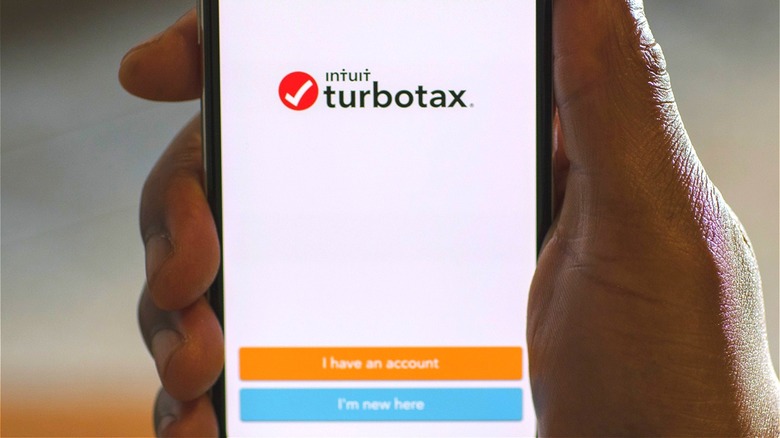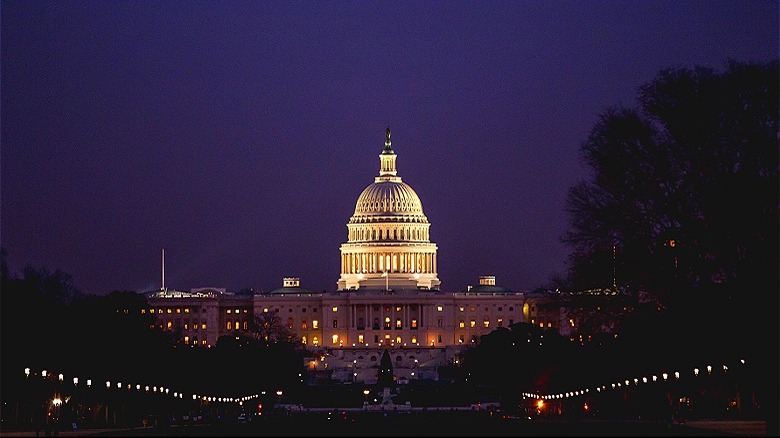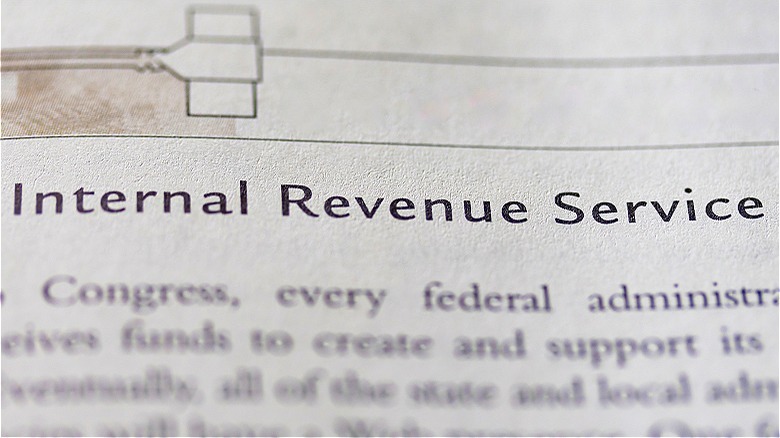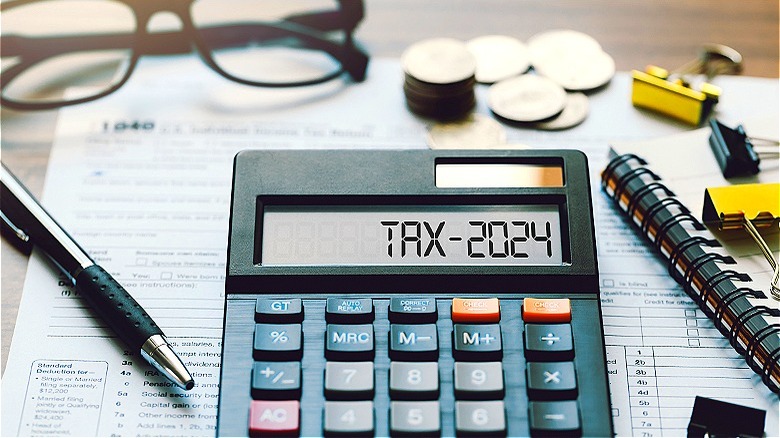The Dark Sides Of TurboTax You'll Wish You Knew About Sooner
TurboTax is a household name in the American tax landscape. Every year, floods of Americans download the latest version of the brand's software in order to seek out the best possible tax refund. With the average in 2024 climbing to $3,145 so far (up from $2,753 the previous year), anyone who hasn't yet filed their return is likely chomping at the bit for their chance to see the refund roll in.
The brand has made a name for itself as a straightforward and helping hand in the tax preparation industry. Today, TurboTax commands a nearly 75% market share of all tax prep revenue. With profits reaching up to $14.4 billion in 2023, there's bound to be a dark spot or two in Intuit and TurboTax's record, right? Well, it turns out that for all the years you've been relying on the product to file your taxes, a darker underbelly has been hiding beneath the surface.
TurboTax is an effective tax filing product, but the brand is hiding other sides to its business that might give you pause next year when you think about gathering your documents and calculating your refund. The suave veneer TurboTax offers to the public is perhaps just part of a larger set of myths surrounding tax season you'd be better off not believing. At the end of the day, whether you continue using the product to file your taxes or not, it's important to know what Intuit has been up to in the background, as its tax software has continued to grow in prominence.
TurboTax is a data mine
Brass tacks: TurboTax, the low-cost or potentially even free tax filing software makes money for its parent company (Intuit) by gathering heaps of data on consumers. Perhaps the most important revenue stream TurboTax generates for its ownership structure comes through the data it collects on users. Moreover, with such a large network of Americans who rely on TurboTax to file their return, this reservoir of information is deep.
Data has become a massive cash flow augmentation, and the trend is only growing more prominent and, therefore, concerning for consumers. Amazon, for example, is a prominent data miner, and it uses the information gathered to create additional spending pressure on Amazon users. The practice isn't new, but it's becoming more varied in order to cash in on lucrative usage opportunities.
Businesses far and wide have discovered the value of robust consumer information gathering, and Intuit has leveraged its divergent business interests to piece together a truly wide-ranging picture of individual financial health on millions of Americans. In coordination with its ownership of tools like Credit Karma and Mint, Intuit has a fully stocked arsenal of data gathering weapons to round out a comprehensive data-driven image of the average consumer, as well as on an individual level.
Intuit has lobbied to keep taxes murky
The federal government occasionally moves on legislation that would make filing taxes easier for Americans. But these efforts are often thwarted by powerful interests in the industry, with TurboTax representing a major stumbling block in the way of overall progress. During the George W. Bush administration, TurboTax lobbying effectively shut down efforts to create a free, government-based electronic filing tool that would have potentially shuttered the company's paid software solution. And again in 2018, the company was involved in lobbying efforts to derail federal designs on creating a centralized filing option.
TurboTax profits are derived from paying customers and the data the brand is able to collect from users. If free and simple filing options, either directly with the IRS or in partnership with it, were to take root, it would severely jeopardize the company's ongoing viability. Therefore, the business has taken steps to interfere with the best interests of the American taxpayer in order to ensure profitability, instead of seeking out ways to improve the experience while offering something that fits with shifting standards and legislation.
Intuit receives bounties from lenders
While TurboTax is a brand that millions of people rely on to quickly and efficiently file their taxes every year, the actual tax preparation and submission procedures involved in its operation are just one aspect. Intuit rakes in huge profits by passing along curated lending product offers to users it has helped. Once a consumer has used Credit Karma, TurboTax, or any other personal finance platform Intuit owns, their data begins to churn around in the system. Intuit's profits are built in part on bounties paid as a referral fee from lenders across the country, and the analysis of personal financial data acts as the perfect matchmaker.
Consumers give TurboTax their most intimate financial information on a yearly basis, allowing Intuit to make sense of their lifestyle and fiscal picture with near-complete clarity. The company then will try to pair people up with new credit cards, personal loans, and other lending products designed to help manage daily financial challenges. Debt consolidation loans, for instance, might be immensely helpful to some, and Intuit likely knows if you're personally one of those people. Millions of taxpayers are just looking to get their filing done correctly and on time, but they get a whole lot more when filing with TurboTax.
TurboTax is revamped every spring
The branding of the software is designed specifically to bring out fears of the big, bad IRS in the lowly taxpayer. Millions of Americans qualify to file their taxes for free, but the TurboTax packages make it seem as if getting your taxes done correctly is a convoluted mess that can only be solved with a friendly helping hand. Each new tier of the software (rising in price with each iteration) purports to improve the experience in some way or another, but the reality is that taxpayers who have done their research into the deductions and tax breaks they're entitled to will yield the same result, no matter what company they pay, or even if they opt to file for free.
The IRS actually makes free filing easy, so there's really no need to resort to working with TurboTax or any other company that introduces hidden fees into its structure or charges for some kind of added "scanning" for refund opportunities. Those living in 12 pilot states — including large ones like California, Massachusetts, Florida, Texas, and New York — are able to file directly with the IRS, and the federal agency also lists free file partners that help taxpayers meet this obligation without cost.
TurboTax buries its free software
In 2022, the Federal Trade Commission sued Intuit over deceptive marketing practices surrounding the use of the word "free." The FTC's press release notes that some of the advertisements in question "have consisted almost entirely of the word 'free' spoken repeatedly," with the overall effect aimed at misleading tax filers hoping to indeed file for free.
Built out in 2002 in conjunction with the IRS, TurboTax and other tax preparers created free filing systems that would help millions of people do their taxes without financial obligations. Shortly after, however, TurboTax created its own free filing program that limited eligibility and levied charges at the end of the process for those who didn't ultimately qualify under these new criteria.
TurboTax's free filing service makes eligibility dependent on various factors, effectively limiting those who qualify to a sliver of the American taxpaying public. While reporting by ProPublica and elsewhere have illuminated the fact that TurboTax has made its free filing edition impossible to find in the past, today it's the first result on Google for the query "turbotax free." Even so, Intuit itself claims that roughly 37% of people qualify to use the free variant of TurboTax.
In years past, TurboTax deployed a sort of bizzarro-SEO strategy to keep its free software from coming up in search engine results. Coupled with a strident push to advertise free filing opportunities, the brand sought to intentionally mislead customers and charge them for a service they could have actually used without cost. Ultimately these practices cost Intuit a $141 million settlement, but the discrepancy between what is actually free and what isn't remains murky at best.





